Como profesor de inglés en Japón, vi cómo mis estudiantes pasaban de sentirse frustrados con ciertos sonidos del inglés a dominarlos con confianza, todo gracias a la práctica constante con trabalenguas. La mejor parte es que mientras te ríes de tus propios intentos, tu cerebro está trabajando duro para dominar esos desafiantes sonidos del inglés.
En este artículo, compartiré contigo los 150 trabalenguas que utilicé en mis clases y que han ayudado a cientos de estudiantes a mejorar su pronunciación en inglés. Desde los más sencillos hasta los más desafiantes, estos trabalenguas están organizados para que puedas progresar gradualmente mientras te diviertes en el proceso.
¿Te interesa aprender inglés más rápido? ¡Lee nuestras otras publicaciones populares!
- Las 13 Mejores Apps Para Aprender Inglés [Guía Inmersiva]
- 9 Tipos De Conectores En Inglés Que Debes Conocer
- Países De Habla Inglesa [11 Curiosidades Que Necesitas Saber]

¿Por qué usar trabalenguas en inglés para mejorar tu pronunciación?
Los trabalenguas en inglés son mucho más que simples juegos de palabras: son herramientas lingüísticas poderosas que entrenan tu cerebro y los músculos de tu boca para dominar los sonidos específicos del inglés.
Por ejemplo, cuando practicas trabalenguas como "Peter Piper picked a peck of pickled peppers", estás trabajando intensamente con fonemas (los sonidos individuales que forman las palabras) que pueden ser especialmente desafiantes para los hispanohablantes, como la diferencia entre el sonido /p/ y /b/, o la pronunciación del sonido /r/ en inglés.
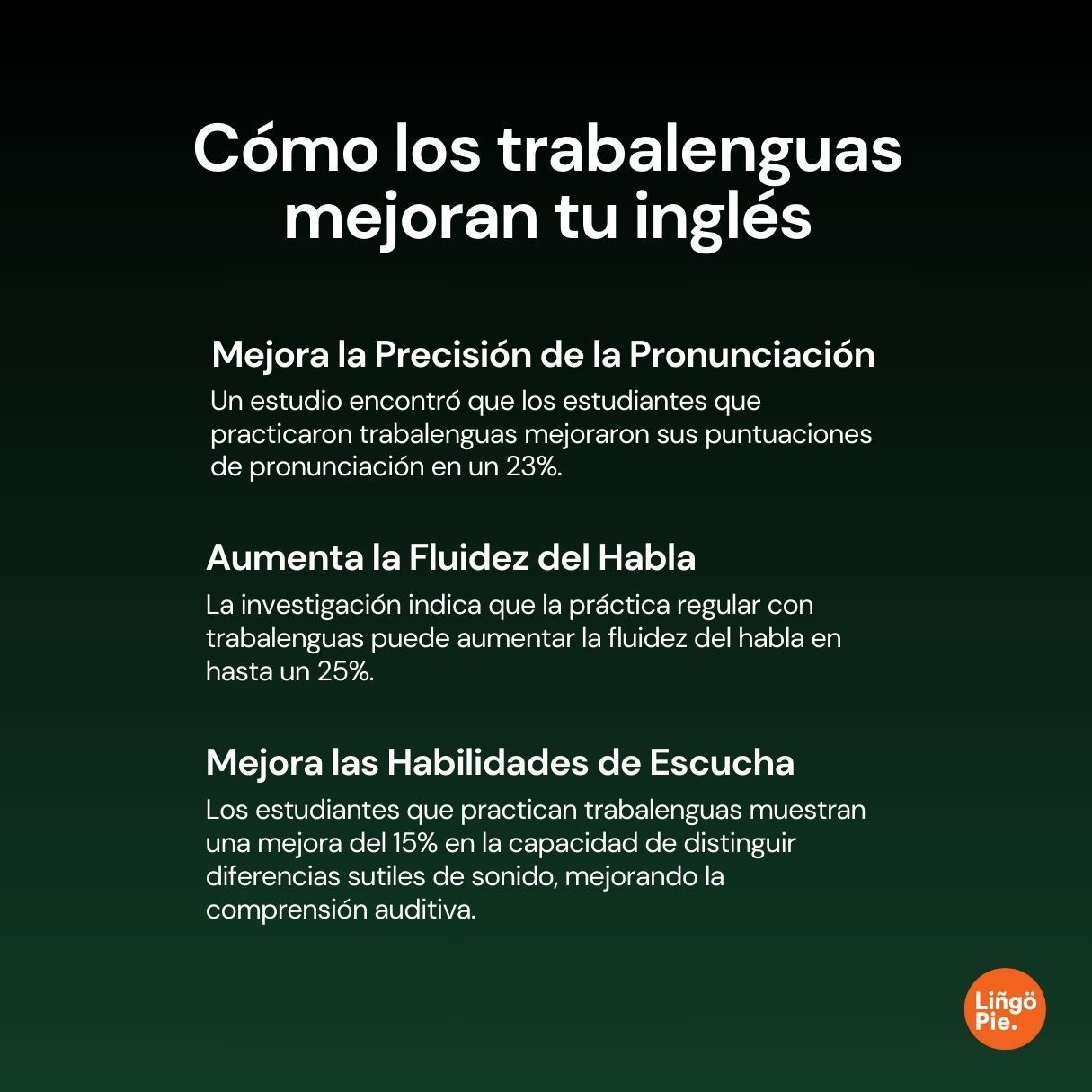
Desde una perspectiva lingüística, los trabalenguas funcionan mediante la repetición concentrada de patrones fonéticos específicos.
Por ejemplo, cuando practicas "She sells seashells by the seashore", estás entrenando tu boca para dominar el sonido /ʃ/ (como en "she" y "shore") y el sonido /s/ (como en "sells" y "seashells"). Esta repetición ayuda a crear nuevas conexiones neuronales en tu cerebro, haciendo que estos sonidos se vuelvan cada vez más naturales y automáticos.

50 Trabalenguas en inglés para principiantes
Para quienes están comenzando su viaje con el inglés, estos trabalenguas se centran en sonidos básicos pero fundamentales. Los hemos organizado en cinco categorías de 10 trabalenguas cada una: sonidos vocálicos simples (/æ/, /ɛ/, /ɪ/), consonantes básicas (/p/, /b/, /t/, /d/), combinaciones sencillas (th-, wh-), palabras monosílabas, y frases cortas de 3-4 palabras.
Sonidos vocálicos simples (/æ/, /ɛ/, /ɪ/)
| Trabalenguas | Guía de pronunciación | Significado |
|---|---|---|
| A black cat sat on a mat | /ə blæk kæt sæt ɒn ə mæt/ | Un gato negro se sentó en una alfombra |
| Red hens peck bread ends | /rɛd hɛnz pɛk brɛd ɛndz/ | Gallinas rojas picotean los extremos del pan |
| Big pigs dig in wigs | /bɪg pɪgz dɪg ɪn wɪgz/ | Cerdos grandes cavan con pelucas |
| Bad Dan ran past sad Sam | /bæd dæn ræn pɑst sæd sæm/ | El malo de Dan corrió junto al triste Sam |
| Ten men met Ben | /tɛn mɛn mɛt bɛn/ | Diez hombres conocieron a Ben |
| Silly Billy sits still | /sɪli bɪli sɪts stɪl/ | El tonto Billy se sienta quieto |
| Pat taps a flat map | /pæt tæps ə flæt mæp/ | Pat golpea un mapa plano |
| Jeff lets Bess rest | /dʒɛf lɛts bɛs rɛst/ | Jeff deja descansar a Bess |
| Jim's pin is thin | /dʒɪmz pɪn ɪz θɪn/ | El alfiler de Jim es delgado |
| Sam's dad had a bad hat | /sæmz dæd hæd ə bæd hæt/ | El papá de Sam tenía un sombrero feo |
Consonantes básicas (/p/, /b/, /t/, /d/)
| Trabalenguas | Guía de pronunciación | Significado |
|---|---|---|
| Peter picks paper | /pitər pɪks peɪpər/ | Peter recoge papel |
| Bobby brings blue balls | /bɒbi brɪŋz blu bɔlz/ | Bobby trae pelotas azules |
| Tiny Tim takes tea | /taɪni tɪm teɪks ti/ | El pequeño Tim toma té |
| Danny does daily deeds | /dæni dʌz deɪli didz/ | Danny hace tareas diarias |
| Pop put paper properly | /pɒp pʊt peɪpər prɒpərli/ | Pop puso el papel correctamente |
| Bob buys big boxes | /bɒb baɪz bɪg bɒksəz/ | Bob compra cajas grandes |
| Tom takes two toys | /tɒm teɪks tu tɔɪz/ | Tom toma dos juguetes |
| Dad digs deep dirt | /dæd dɪgz dip dɜrt/ | Papá cava tierra profunda |
| Puppy plays ping pong | /pʌpi pleɪz pɪŋ pɒŋ/ | El cachorro juega ping pong |
| Baby bird brings bread | /beɪbi bɜrd brɪŋz brɛd/ | El pájaro bebé trae pan |
Combinaciones sencillas (th-, wh-)
| Trabalenguas | Guía de pronunciación | Significado |
|---|---|---|
| This that these those | /ðɪs ðæt ðiz ðoʊz/ | Esto, eso, estos, esos |
| Think thin things | /θɪŋk θɪn θɪŋz/ | Piensa cosas delgadas |
| Where were white whales? | /wɛər wɜr waɪt weɪlz/ | ¿Dónde estaban las ballenas blancas? |
| Three thick thumbs | /θri θɪk θʌmz/ | Tres pulgares gruesos |
| What where when why | /wɒt wɛər wɛn waɪ/ | Qué, dónde, cuándo, por qué |
| The three trees | /ðə θri triz/ | Los tres árboles |
| Which witch wishes | /wɪtʃ wɪtʃ wɪʃəz/ | Qué bruja desea |
| Think thanks then that | /θɪŋk θæŋks ðɛn ðæt/ | Piensa gracias luego eso |
| When wheels whirl | /wɛn wilz wɜrl/ | Cuando las ruedas giran |
| They thank the three | /ðeɪ θæŋk ðə θri/ | Ellos agradecen a los tres |
Palabras monosílabas
| Trabalenguas | Guía de pronunciación | Significado |
|---|---|---|
| Red bed head fed | /rɛd bɛd hɛd fɛd/ | Rojo cama cabeza alimentado |
| Click clock clack | /klɪk klɒk klæk/ | Clic reloj chasquido |
| Fish fresh fried | /fɪʃ frɛʃ fraɪd/ | Pescado fresco frito |
| Stop step stick | /stɒp stɛp stɪk/ | Para paso palo |
| Ring rang rung | /rɪŋ ræŋ rʌŋ/ | Anillo sonó sonado |
| Snip snap snup | /snɪp snæp snʌp/ | Cortar chasquear sorber |
| Wish wash wish | /wɪʃ wɒʃ wɪʃ/ | Deseo lavar deseo |
| Tick tock talk | /tɪk tɒk tɔk/ | Tic tac hablar |
| Ping pong pang | /pɪŋ pɒŋ pæŋ/ | Ping pong pang |
| Drip drop droop | /drɪp drɒp drup/ | Gotear caer colgar |
Frases cortas de 3-4 palabras
| Trabalenguas | Guía de pronunciación | Significado |
|---|---|---|
| Five fat fish | /faɪv fæt fɪʃ/ | Cinco peces gordos |
| Six slim snakes | /sɪks slɪm sneɪks/ | Seis serpientes delgadas |
| Red rats run | /rɛd ræts rʌn/ | Las ratas rojas corren |
| Cute cats can't cook | /kjut kæts kɑnt kʊk/ | Los gatos lindos no pueden cocinar |
| My mom makes milk | /maɪ mɒm meɪks mɪlk/ | Mi mamá hace leche |
| Small snails slide slowly | /smɔl sneɪlz slaɪd sloʊli/ | Los caracoles pequeños se deslizan lentamente |
| Two tops tip | /tu tɒps tɪp/ | Dos trompos se inclinan |
| Ducks don't dance | /dʌks doʊnt dæns/ | Los patos no bailan |
| Fast frogs flip | /fæst frɒgz flɪp/ | Las ranas rápidas saltan |
| Sweet sheep sleep | /swit ʃip slip/ | Las dulces ovejas duermen |
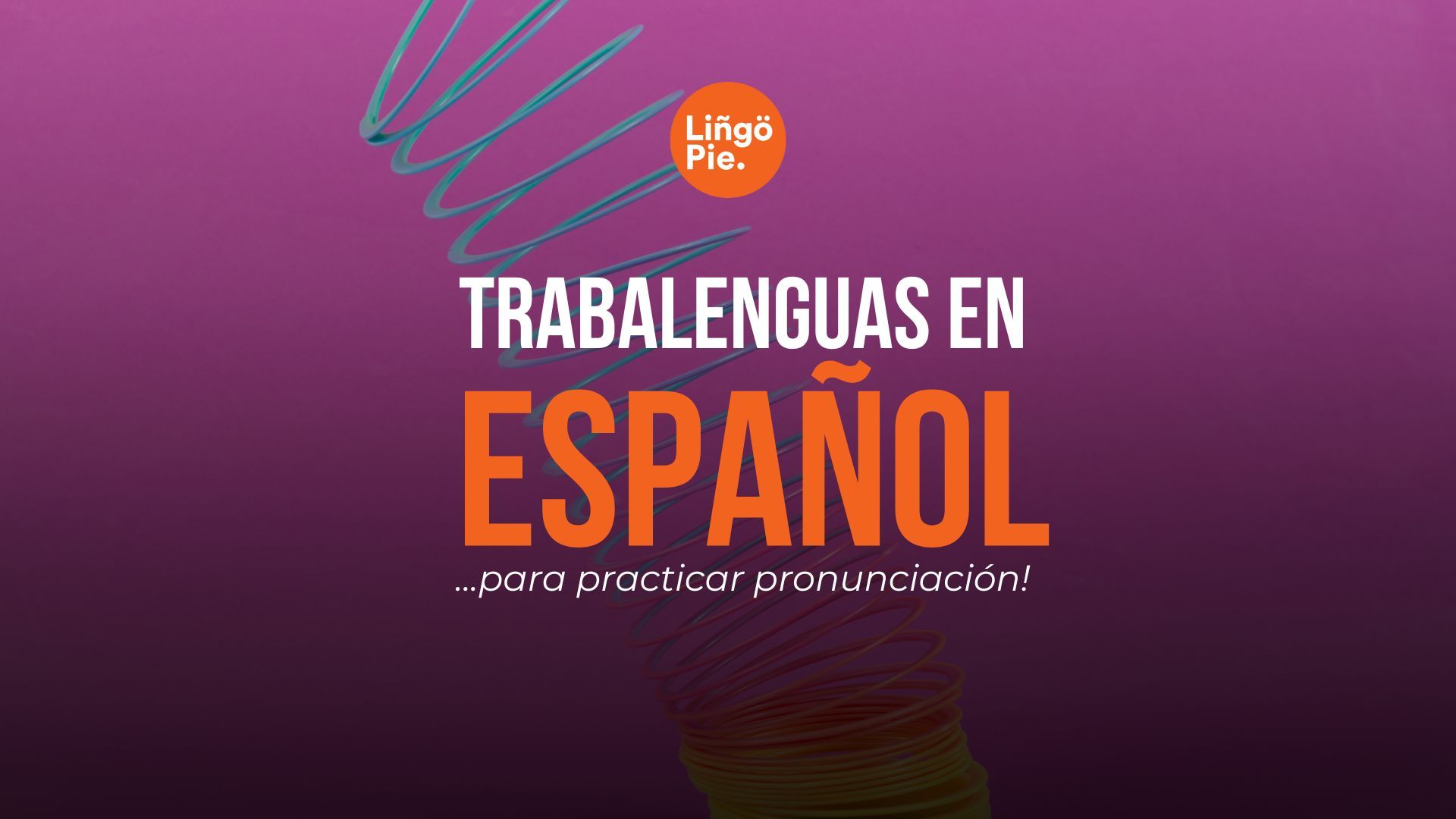

50 trabalenguas en inglés para estudiantes de nivel intermedio
En el nivel intermedio, los trabalenguas se vuelven más elaborados y trabajan con combinaciones de sonidos más desafiantes. Esta sección está dividida en: trabalenguas con consonantes agrupadas (str-, spr-, scr-), pares de sonidos similares (/v/ vs /b/, /p/ vs /b/), sonidos vocálicos complejos (diptongos), patrones de entonación, y trabalenguas con juegos de palabras.
Consonantes agrupadas (str-, spr-, scr-)
| Trabalenguas | Guía de pronunciación | Significado |
|---|---|---|
| She sells seashells by the seashore | /ʃi sɛlz siʃɛlz baɪ ðə siʃɔr/ | Ella vende conchas marinas junto al mar |
| Street stripes stretch straight | /strit straɪps strɛtʃ streɪt/ | Las rayas de la calle se estiran rectas |
| How much wood would a woodchuck chuck | /haʊ mʌtʃ wʊd wʊd ə wʊdtʃʌk tʃʌk/ | Cuánta madera podría lanzar una marmota |
| Betty Botter bought some butter | /bɛti bɒtər bɔt səm bʌtər/ | Betty Botter compró un poco de mantequilla |
| Sally sells silly seashells | /sæli sɛlz sɪli siʃɛlz/ | Sally vende conchas marinas tontas |
| Silly Sally strictly sells seashells | /sɪli sæli strɪktli sɛlz siʃɛlz/ | La tonta Sally vende estrictamente conchas marinas |
| Spreading spring sprouts sprouted | /sprɛdɪŋ sprɪŋ spraʊts spraʊtɪd/ | Los brotes primaverales que se esparcen brotaron |
| Scripty scratchy scrawly scribbles | /skrɪpti skrætʃi skrɔli skrɪbəlz/ | Garabatos escritos rayados y desordenados |
| Strange strategic strings stretch | /streɪndʒ strətidʒɪk strɪŋz strɛtʃ/ | Cuerdas estratégicas extrañas se estiran |
| Strong strings spring straight | /strɔŋ strɪŋz sprɪŋ streɪt/ | Las cuerdas fuertes saltan rectas |
Pares de sonidos similares (/v/ vs /b/, /p/ vs /b/)
| Trabalenguas | Guía de pronunciación | Significado |
|---|---|---|
| Vincent vowed vengeance very valiantly | /vɪnsənt vaʊd vɛndʒəns vɛri væljəntli/ | Vincent juró venganza muy valientemente |
| Big black bugs bleed blue blood | /bɪg blæk bʌgz blid blu blʌd/ | Los grandes insectos negros sangran sangre azul |
| Violet vines viewed very vividly | /vaɪələt vaɪnz vjud vɛri vɪvɪdli/ | Enredaderas violetas vistas muy vívidamente |
| Better butter makes bitter batter better | /bɛtər bʌtər meɪks bɪtər bætər bɛtər/ | La mejor mantequilla hace mejor la masa amarga |
| A proper copper coffee pot | /ə prɒpər kɒpər kɒfi pɒt/ | Una cafetera de cobre apropiada |
| Nine nimble noblemen nibbling | /naɪn nɪmbəl noʊbəlmɛn nɪblɪŋ/ | Nueve nobles ágiles mordisqueando |
| Brave validators verify values | /breɪv vælədeɪtərz vɛrəfaɪ væljuz/ | Valientes validadores verifican valores |
| Purple paper people | /pɜrpəl peɪpər pipəl/ | Gente de papel púrpura |
| Bouncing bunnies bring big baskets | /baʊnsɪŋ bʌniz brɪŋ bɪg bæskəts/ | Los conejos saltarines traen grandes canastas |
| Very vivid vests vest vibrantly | /vɛri vɪvɪd vɛsts vɛst vaɪbrəntli/ | Los chalecos muy vívidos se visten vibrantemente |
Sonidos vocálicos complejos (diptongos)
| Trabalenguas | Guía de pronunciación | Significado |
|---|---|---|
| How now brown cow | /haʊ naʊ braʊn kaʊ/ | Cómo ahora vaca marrón |
| Eight great gray whales | /eɪt greɪt greɪ weɪlz/ | Ocho grandes ballenas grises |
| Fly high in my sky | /flaɪ haɪ ɪn maɪ skaɪ/ | Vuela alto en mi cielo |
| Near the ear, a deer appears | /nɪr ði ɪr ə dɪr əpɪrz/ | Cerca del oído, un ciervo aparece |
| Coy Roy's toy boy | /kɔɪ rɔɪz tɔɪ bɔɪ/ | El chico juguete del tímido Roy |
| The rain in Spain stays mainly in the plain | /ðə reɪn ɪn speɪn steɪz meɪnli ɪn ðə pleɪn/ | La lluvia en España se mantiene principalmente en la llanura |
| Snow flows slow below | /snoʊ floʊz sloʊ bɪloʊ/ | La nieve fluye lenta abajo |
| My dire tire mire | /maɪ daɪər taɪər maɪər/ | Mi terrible neumático lodoso |
| Pound round ground sound | /paʊnd raʊnd graʊnd saʊnd/ | Sonido de libra redonda tierra |
| Grow snow glow flow | /groʊ snoʊ gloʊ floʊ/ | Crece nieve brillo flujo |
Patrones de entonación y ritmo
| Trabalenguas | Guía de pronunciación | Significado |
|---|---|---|
| I scream, you scream, we all scream for ice cream | /aɪ skrim ju skrim wi ɔl skrim fɔr aɪs krim/ | Yo grito, tú gritas, todos gritamos por helado |
| If two witches were watching two watches, which witch would watch which watch? | /ɪf tu wɪtʃəz wər wɒtʃɪŋ tu wɒtʃəz wɪtʃ wɪtʃ wʊd wɒtʃ wɪtʃ wɒtʃ/ | Si dos brujas estuvieran mirando dos relojes, ¿qué bruja miraría qué reloj? |
| Whether the weather is warm, whether the weather is hot | /wɛðər ðə wɛðər ɪz wɔrm wɛðər ðə wɛðər ɪz hɒt/ | Si el clima es cálido, si el clima es caliente |
| Thirty-three thousand thieves thought thoroughly | /θɜrti-θri θaʊzənd θivz θɔt θʌrəli/ | Treinta y tres mil ladrones pensaron minuciosamente |
| Six slick slim sycamore saplings | /sɪks slɪk slɪm sɪkəmɔr sæplɪŋz/ | Seis plántulas de sicómoro delgadas y lisas |
| Three free throws freely thrown | /θri fri θroʊz frili θroʊn/ | Tres tiros libres lanzados libremente |
| Each Easter Eddie eats eighty Easter eggs | /itʃ istər ɛdi its eɪti istər ɛgz/ | Cada Pascua Eddie come ochenta huevos de Pascua |
| Five fine fresh fish for free | /faɪv faɪn frɛʃ fɪʃ fɔr fri/ | Cinco buenos pescados frescos gratis |
| Round and round the rugged rocks | /raʊnd ænd raʊnd ðə rʌgəd rɒks/ | Alrededor y alrededor de las rocas escarpadas |
| Many mumbling mice making midnight music | /mɛni mʌmblɪŋ maɪs meɪkɪŋ mɪdnaɪt mjuzɪk/ | Muchos ratones murmurando haciendo música de medianoche |
Juegos de palabras y aliteraciones
| Trabalenguas | Guía de pronunciación | Significado |
|---|---|---|
| A proper copper coffee pot | /ə prɒpər kɒpər kɒfi pɒt/ | Una cafetera de cobre apropiada |
| Fuzzy Wuzzy was a bear, Fuzzy Wuzzy had no hair | /fʌzi wʌzi wəz ə bɛr fʌzi wʌzi hæd noʊ hɛr/ | Fuzzy Wuzzy era un oso, Fuzzy Wuzzy no tenía pelo |
| She sees cheese freeze | /ʃi siz tʃiz friz/ | Ella ve el queso congelarse |
| Can you can a can as a canner can can a can? | /kæn ju kæn ə kæn æz ə kænər kæn kæn ə kæn/ | ¿Puedes enlatar una lata como un enlatador puede enlatar una lata? |
| Will you write what's right or write what you write? | /wɪl ju raɪt wəts raɪt ɔr raɪt wət ju raɪt/ | ¿Escribirás lo que está bien o escribirás lo que escribes? |
| Which witch wished which wicked wish? | /wɪtʃ wɪtʃ wɪʃt wɪtʃ wɪkəd wɪʃ/ | ¿Qué bruja deseó qué deseo malvado? |
| Wayne went to wales to watch walruses | /weɪn wɛnt tu weɪlz tu wɒtʃ wɔlrəsəz/ | Wayne fue a Gales a ver morsas |
| Yellow butter, purple jelly, red jam, black bread | /jɛloʊ bʌtər pɜrpəl dʒɛli rɛd dʒæm blæk brɛd/ | Mantequilla amarilla, jalea morada, mermelada roja, pan negro |
| Brad's big black bath brush broke | /brædz bɪg blæk bæθ brʌʃ broʊk/ | El gran cepillo negro de baño de Brad se rompió |
| Six sticky skeletons | /sɪks stɪki skɛlətənz/ | Seis esqueletos pegajosos |
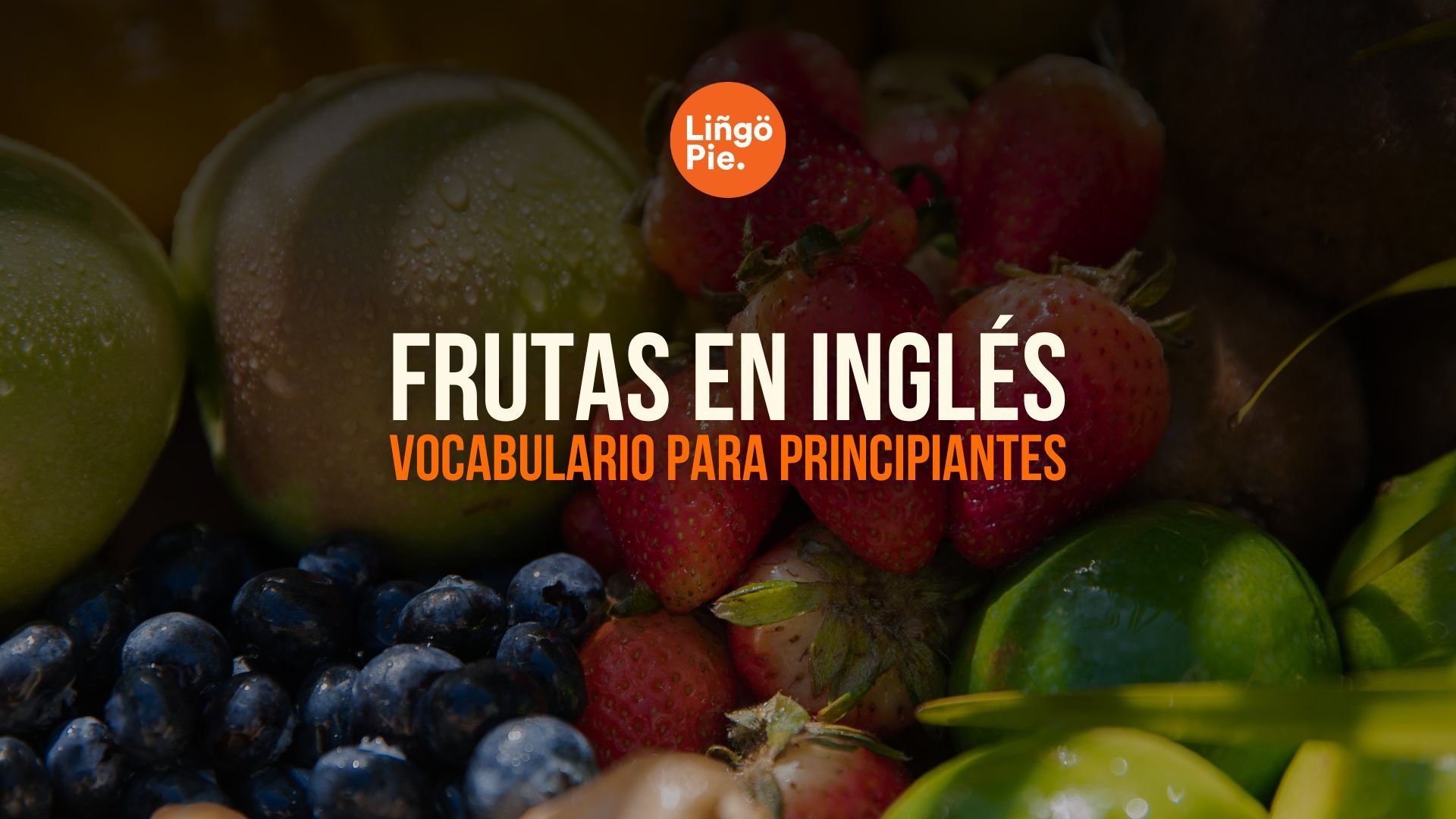

50 trabalenguas en inglés para estudiantes avanzados
Los trabalenguas avanzados están diseñados para perfeccionar tu pronunciación hasta un nivel casi nativo. Se dividen en: trabalenguas largos con múltiples patrones de sonido, trabalenguas con vocabulario académico y profesional, variaciones de acentos (británico vs americano), trabalenguas con homófonos y heterónimos, y trabalenguas que juegan con el ritmo y la entonación natural del inglés.
Trabalenguas largos con múltiples patrones
- Peter Piper picked a peck of pickled peppers. A peck of pickled peppers Peter Piper picked. If Peter Piper picked a peck of pickled peppers, where's the peck of pickled peppers Peter Piper picked?
- She sells seashells by the seashore. The shells she sells are surely seashells. So if she sells shells on the seashore, I'm sure she sells seashore shells.
- Betty Botter bought some butter, but she said, "This butter's bitter. If I put it in my batter, it will make my batter bitter. But a bit of better butter will make my bitter batter better."
- How much wood would a woodchuck chuck if a woodchuck could chuck wood? He would chuck, he would, as much as he could, and chuck as much wood as a woodchuck would if a woodchuck could chuck wood.
- The sixth sick sheikh's sixth sheep's sick. The sixth sick sheikh's sixth sheep's sick. The sixth sick sheikh's sixth sheep's sick.
- If you must cross a course cross cow across a crowded cow crossing, cross the cross coarse cow across the crowded cow crossing carefully.
- I scream, you scream, we all scream for ice cream. When all scream for ice cream, what ice cream do we all scream for when we all scream for ice cream?
- Whether the weather be fine, or whether the weather be not, whether the weather be cold, or whether the weather be hot, we'll weather the weather whatever the weather, whether we like it or not.
- Fuzzy Wuzzy was a bear. Fuzzy Wuzzy had no hair. Fuzzy Wuzzy wasn't fuzzy, was he? If Fuzzy Wuzzy wasn't fuzzy, why was Fuzzy Wuzzy fuzzy?
- Sister Susie's sewing shirts for soldiers. Some soldiers send epistles, say they'd rather sleep in thistles than the saucy, soft, short shirts for soldiers Sister Susie sews.
Trabalenguas con vocabulario académico y profesional
- Sophisticated statisticians systematically standardize statistical specifications specifically specifying synchronized specifications.
- Philosophical philanthropists phenomenally facilitate philanthropic phenomena through phenomenological philanthropy procedures.
- Distinguished diagnosticians diligently diagnose diagnostic dilemmas dealing with distinctive digestive disorders.
- Meticulous methodological mathematicians make meaningful measurements monitoring microscopic mathematical mechanisms.
- Conscientious cryptographers carefully calculate cryptographic configurations creating complicated cryptographic codes.
- Epistemological entrepreneurs enthusiastically evaluate entrepreneurial enterprises establishing educational establishments.
- Neurophysiological specialists specifically specify sophisticated specifications surrounding synaptic situations.
- Theoretical thermodynamicists thoroughly think through thermodynamic theorems testing thermal theoretical thresholds.
- Psychological practitioners practically practice psychological principles proposing progressive psychological processes.
- Technological terminologists technically terminate terminology through theoretical tactical techniques.
Trabalenguas con homófonos y heterónimos
- The fair bear felt fair to tear and bear the pear and pair of rare fair fares.
- The lead singer will lead us past the lead mine where the read signs are read left to right.
- The dove dove deep where deep doves dive while live fish live beneath the surface.
- I object to that object which was present at the present time in the desert dessert.
- The close winds wound close to the wound that wound around the close gate.
- The bass played the bass while fishing for bass in the bass strait at the base of the base.
- The polish man used Polish polish to polish Polish shoes in the Polish store.
- When the train trains, it trains well to train well on the training train track.
- The minute minute changes meant minute differences in the minute details.
- The produce farmer can produce produce that reproduces to produce more produce.
Trabalenguas que juegan con el ritmo y la entonación natural del inglés
- Rapidly rattling rhythmically through ridiculously rigorous rhyming riddles.
- Musical melodies melodiously move through morning's misty mountains majestically.
- Dancing delightfully down deliriously delicate daisy-decorated dendrites.
- Whimsically whistling while whimsically wandering where wild winds whisper.
- Gracefully gliding through gleaming glades, glowing gloriously in golden gradients.
- Eloquently expressing energetic emotions, eagerly echoing ethereal elements.
- Symphonically sailing through swiftly swaying silver-sailed seasons.
- Harmoniously humming heavenly hymns, happily hovering high here.
- Rhythmically racing 'round rolling rivers, radiantly reflecting rainbow refractions.
- Melodiously moving through mysteriously magical moonlit moments meaningfully.
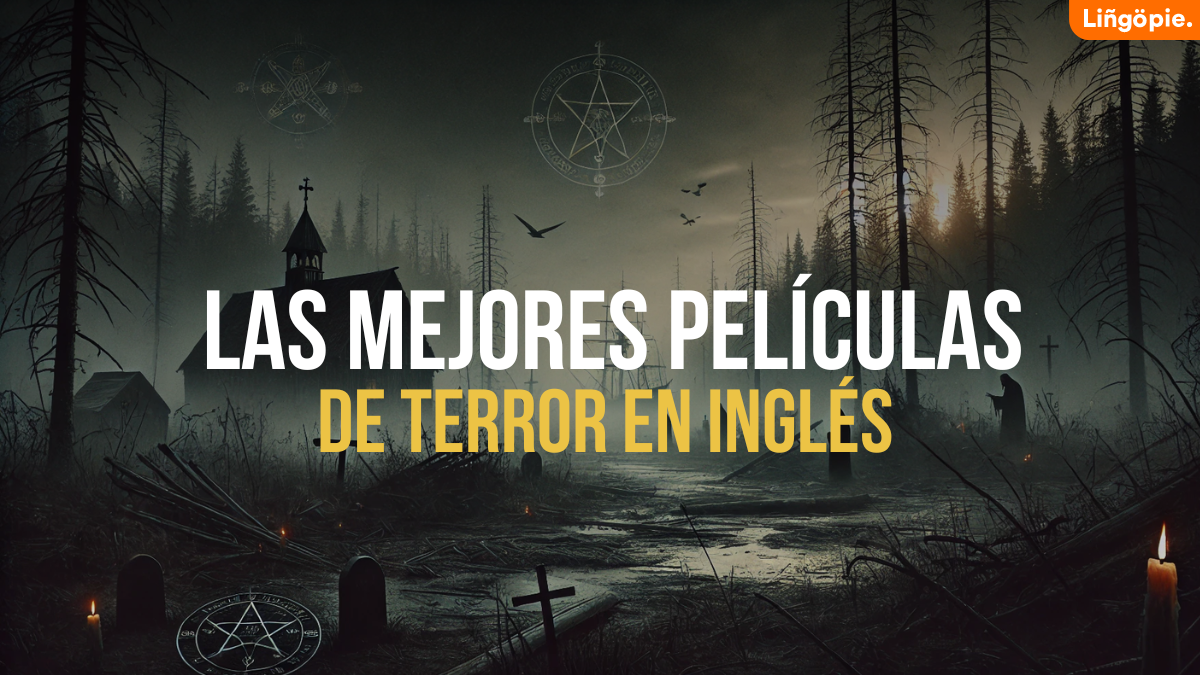
Aprende inglés con Lingopie
¿Listo para poner en práctica estos trabalenguas? Con Lingopie, puedes complementar tu práctica de pronunciación viendo series y películas en inglés donde escucharás estos y muchos otros patrones de sonido en contextos reales y emocionantes. Nuestro contenido incluye subtítulos duales y la capacidad de hacer clic en cualquier palabra para ver su significado, lo que te ayudará a comprender mejor cómo los hablantes nativos manejan estos desafiantes sonidos del inglés.
¿Listo para llevar tu inglés al siguiente nivel? ¡Comienza tu prueba gratuita hoy!


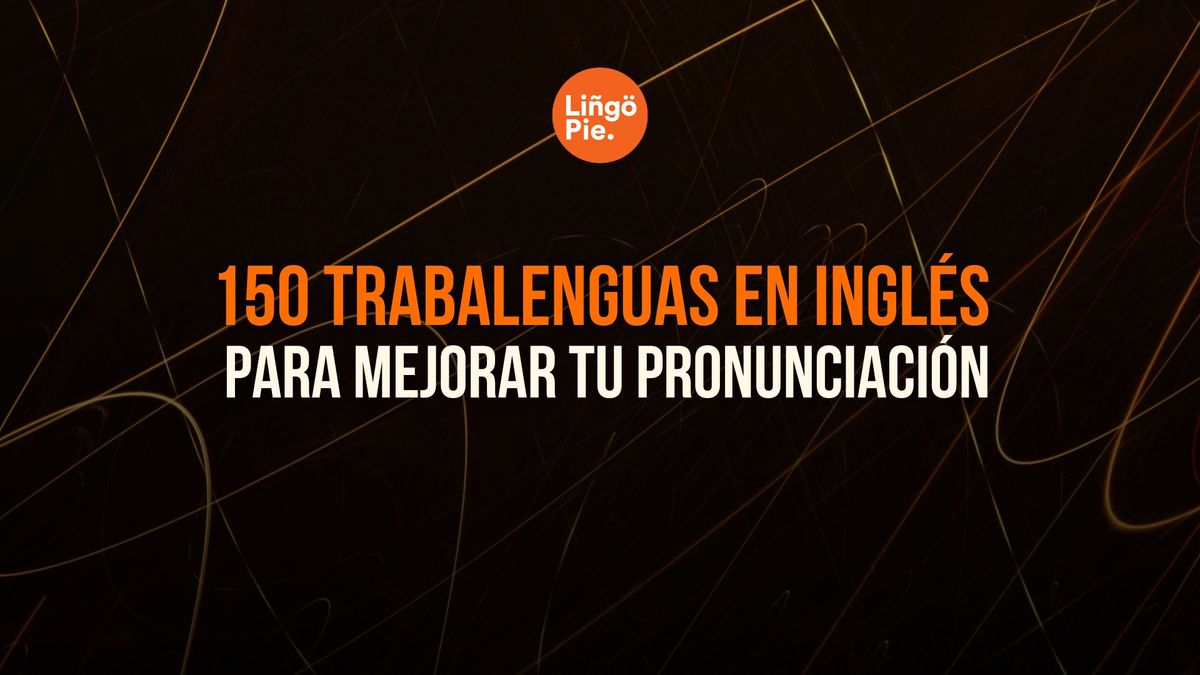



![Países De Habla Inglesa [11 Curiosidades Que Necesitas Saber]](/blog/content/images/size/w1200/2024/11/Portada---2024-11-03T000655.410-5.png)
![¿Cuánto tiempo lleva aprender inglés desde cero? [Guía práctica para principiantes]](/blog/content/images/size/w300/2026/02/Portada--16-.png)


![Vocabulario De Medicina En Inglés [Guía Práctica Para Emergencias]](/blog/content/images/size/w300/2025/12/Portada--18-.png)